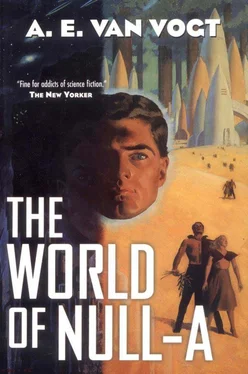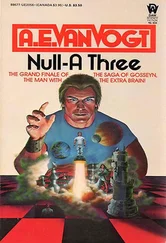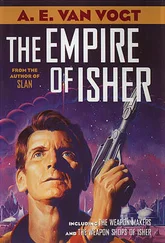Unquestionably, the doctor had discovered a basic flaw in his story. But it was a flaw that, in itself, required weighty explanations. It was a flaw that could not be dismissed by a refusal to face it squarely.
Prescott was watching him narrowly. “I suppose,” he said, “you realize that there is a lie detector in the room.”
Gosseyn stared at him as a hypnotized bird might gaze at a snake. There was silence, except for a queer drumming sound at the back of Gosseyn's mind. He began to feel dizzy. His vision blurred. He sat cold and tense.
“It would be interesting,” Prescott went on inexorably, “To find out if there really was another body.”
“Yes,” said Gosseyn at last, blankly. “Yes, it would be interesting.”
Now that the words had been used, the picture presented to him this way, he didn't believe his story himself. He felt reluctant to put it to the test. Yet long before
Prescott had mentioned the detector, he had known there could be no evading its use. He went over to it. He put his hands on the metal contacts and waited while the sensitive energy-conducting lights played over his face.
“You've heard what we've been saying,” he said. “What is your verdict?”
“It is impossible for me to prove or disprove your story. My judgments are based on memory flow. You have the memory of Gilbert Gosseyn I. That includes a memory of having been killed so realistically that I hesitate to say it couldn't have been death. There is still no clue as to your real identity.”
For better or worse it was a moment for decision. Gosseyn bent down and untied the woman's feet though not her hands. He helped her stand up.
“My plan,” he said, “is to take you with me for about a mile, then let you come back and release your husband.”
He had another reason for taking her along. He intended to tell her what the situation was and what he had heard about her husband (though not that Patricia had said it), and so he would leave the problem of what to do with Prescott up to her.
He told her during the final quarter of a mile before untying her hands. When he had finished, she was silent for so long that he added finally, “Your husband may decide to prevent you from passing on the facts I've given you. On the other hand, his belief in null-A may be stronger than his loyalty to his government. You'll have to make up your mind about that from your own knowledge of him.”
The woman sighed. But all she said was, “I understand.”
“This hospital,” said Gosseyn, “how does it work?” It was a point he wanted to clear up.
“It's all volunteer, of course,” she said. “We're on Hospital Exchange. When somebody gets hurt or wants hospitalization, the robot exchange calls the nearest suitable unit. Then we accept or refuse the patient. Lately, I have been turning them down because–” She stopped. She looked at Gosseyn earnestly. “Thank you for everything. Thank you very much.” She hesitated. “I intend to trust him,” she said, “but I'll let you have a good start first.”
“Good luck!” said Gosseyn.
He watched her as she started on the return journey. Woman the nurturer, he thought, woman the healer, the teacher, the understanding spirit, the lover. Woman! Not merely an imitation of man. In everything that he had seen her do and heard her say, she was a woman's woman in the fullest null-A sense-under terrific pressure now and accordingly low in energy, but even that could not conceal the warm-hearted human being underneath.
He came out of his reverie, and, turning on his heel, continued on his way toward the forest. The grass was soft beneath his feet, and there was still a sort of path, as if others less earnestly bent had walked this way, lightly, airily, and left an imprint of happy strolls through the dusk of warm and fragrant evenings.
The fragrance was lingeringly there, sweetly, deliriously there. The scent of growing greens was a thick perfume headily intermixed with the fresh feel of the afternoon rain. Gosseyn had the exhilarating conviction of an adventure begun in paradise. For a while there was the hissing swish of the river, near by now. But that faded as he entered the shadows under the titan trees.
Shadows. It was like coming into a cave from bright day. It was like a corridor that kept twisting, changing, curving, now opening up into great antechambers, now narrowing down to a pathless tangle of tall, spreading shrubbery, but always with a roof overhead to hide the sky. He realized it would be hard to sustain his sense of direction among the trees. But he had a compass, which should keep him on his general course. He could hope for no more than that.
He was still walking along in the apparently interminable forest when he noticed that the shadows around him were darkening. There was no question finally but that night was falling. He was just beginning to wonder if he would have to sleep under the trees when he emerged from behind a huge bole into a large, open meadow.
He found a grassy nook and he was settling himself when a plane winged silently over the edge of a near-by hill. It came down fifty feet away from him, and rolled to a stop. A light flashed on in its nose. It swung around with an easy gliding movement, and caught Gosseyn in a blaze of sunlike brilliance. Out of the brightness a voice came.
“Gilbert Gosseyn, I am not an enemy, but I cannot make any explanation until you are in the plane. To insure that you will get in without argument or delay, I call your attention to the half-dozen guns that are pointing at you. There is no escape.”
Gosseyn saw the guns, snouted barrel ends that poked out of the fuselage, and followed his movements. So long as they were there, it didn't matter whether he believed or disbelieved that it was not an enemy. Without a word he went around to the side of the plane and climbed into the open door that was there. He had barely time to slip into the nearest seat. The door slammed. All the lights blinked out. The machine raced forward and became airborne. It climbed steeply into the night sky.
Gosseyn watched the dark ground below become formless. Swiftly the world of giant trees and the mountain land were at one with the night. A uniform black enveloped the hurtling machine. Anywhere from three to five minutes ticked by, and then slowly the plane leveled off. The lights flashed on, and the voice of the roboplane said, “During the next ten minutes you may ask any questions you please. After that I must give you landing instructions.”
It took a moment to adjust to that. Any questions. Gosseyn found his voice. The first question was easy enough.
“Who are you?”
“An agent of the Games Machine.”
Gosseyn sighed with relief. Then: “Is the Machine speaking through you to me?”
“Only indirectly. The Machine can receive messages from Venus, but cannot itself broadcast on interplanetary wave lengths.”
“You're on your own?”
“I have my instructions.”
Gosseyn took a deep breath. “Who am I?”
He waited, every muscle tensed, and then sagged back in his seat as the roboplane answered, “I'm sorry, but you are wasting time. I have no information about your past, only about your present situation.”
“Does the Machine know?” he persisted.
“If it does, it did not confide in me.”
Gosseyn felt desperate. “But I've got to know something. What about my feeling that I was killed?”
“Your body,” said the roboplane in its level voice, “was badly damaged and burned when you were killed. But I have no idea how you still happen to be alive.” It broke off. “Mr. Gosseyn, I strongly urge you to ask your questions on the Venusian situation. Or perhaps you would like me to give you a rapid summary of the conditions that prevail here on the eve of the invasion of Venus.”
Читать дальше










